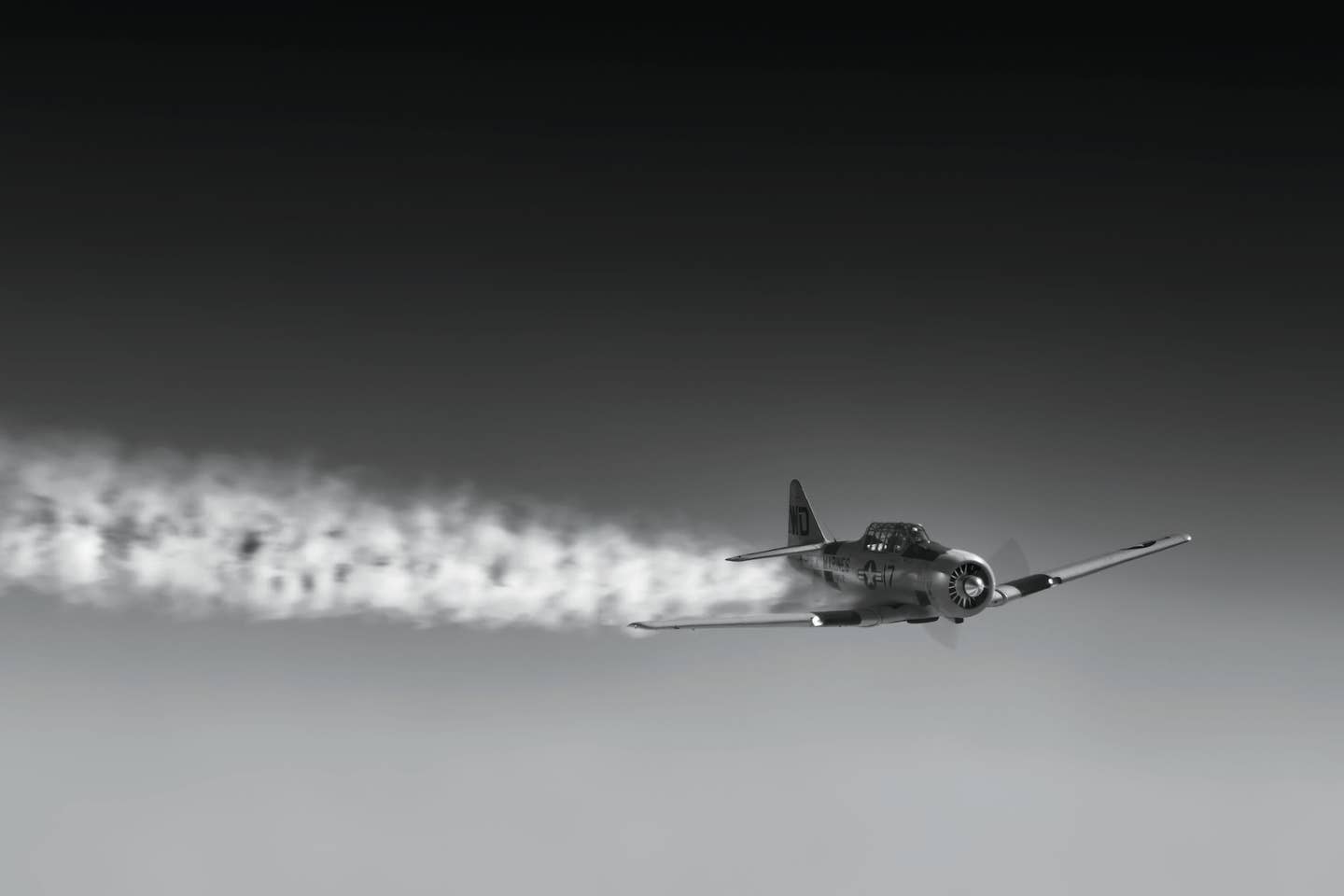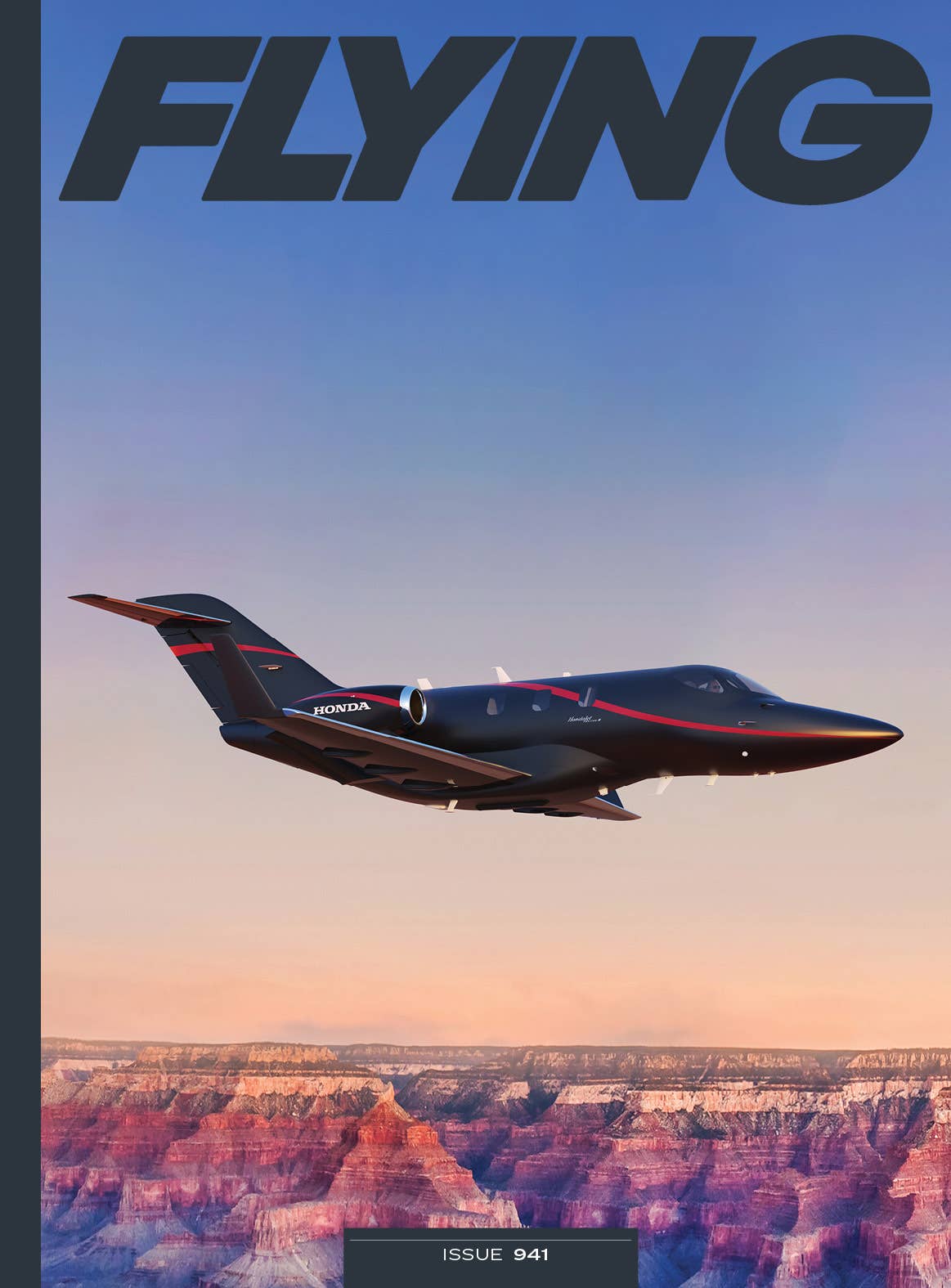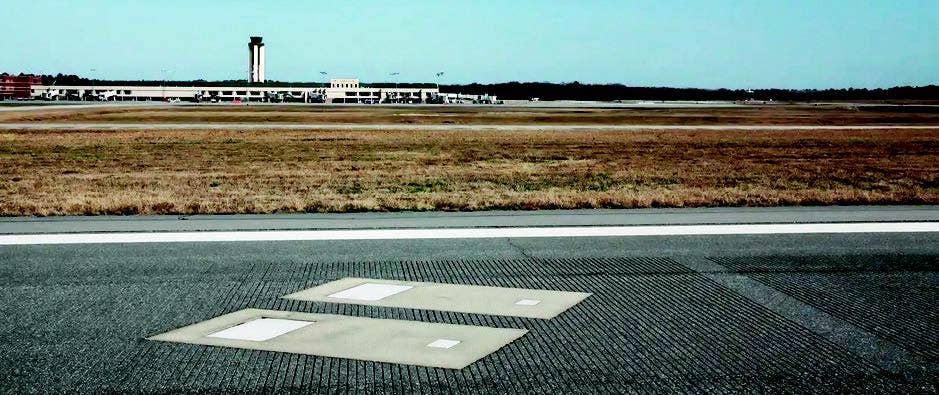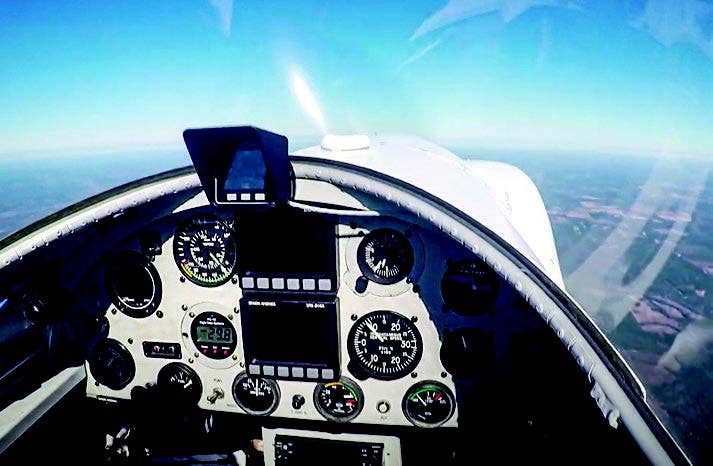There Was Just Something About Michael
Departed dear pilot friend was his own man on the ground and in the air.

FLYING contributor Martha Lunken recalls a dear pilot friend taking her up for a ride in a T-6 like this one at night during the early 1960s. [iStock]
Let me tell you about Michael…at least, I’ll try… but he nearly defies description. Michael was Huck Finn, Mr. Wizard, an Irishman tattooed with a four-leaf clover, and Peter Pan to my Wendy. Understand that most of these adventures and shenanigans took place in simpler times when general aviation was free of ADS-B, camera surveillance, complex airspace restrictions, and overzealous FAA inspectors. I’m not sure if GA is really safer these days, but it sure isn’t as much fun.
When I was learning to fly during winter 1961-62, there were several ratty-looking AT-6s and Beech 18s tied down in the grass outside the flying school shack. A guy named Michael who owned one of the AT-6s was, I thought, an interesting-looking guy. I’d see him at Mass at Christ the King Church—usually standing against a side wall because he’d arrived late (in those days, Catholic Sunday Masses were always crowded).
If you're not already a subscriber, what are you waiting for? Subscribe today to get the issue as soon as it is released in either Print or Digital formats.
Subscribe NowUsing side glances, I pointed him out to my sister, but maybe I wasn’t as discreet as I thought because, a few days later, at the airport, he introduced himself and invited me for a ride in the T-6…at night…Wow! So, he belted me in and I was flat-out thrilled by the awesome power and noise on takeoff. We climbed on top of a thin overcast and rolled and looped with the lights of the city visible through the misty clouds below and clear stars shining above. Well, what do you expect? I fell madly in love—with the AT-6 and Michael.
After graduating from college and serving in the Air Force flying B-25s on flight check missions, Michael was working for a Cincinnati company that sold dry cleaning store franchises, and he used that T-6 for sales calls in his territory throughout the Midwest and South. Curiously, despite the Air Force training and experience, he thought filing IFR was like “being in jail.” When the weather was down in those pre-GPS days, he commonly flew airways at 500 feet below the MEA and made an approach at his destination. I know, I know…
We flew a night mission in a Piper Aztec loaded with freight from Cincinnati to Baltimore for a local character named “TV Tom.” Coming back over the Alleghenies, to avoid filing we climbed to 18,000 feet msl for about an hour to stay above an icy cloud cover. But we were young, and I guess the Lord was looking out for fools like us.
Before I knew him, Michael had acquired a little floatplane time at a seaplane base on the Ohio River down the road from the airport. Barely out of his teens and with Lord knows what kind of certificates and ratings (definitely not seaplane), he ferried a Piper J-3 Cub on floats to a buyer in Florida. Think about that…a 10-gallon fuel tank and a 5-gallon can of car gas strapped in the front seat. Sure, there are lots of lakes and rivers between southern Ohio and Florida, but it’s still pretty gutsy. He was good at en route repairs…rarely “by the book” or with approved parts—but good enough to hang things together. The luck of the Irish.
He wasn’t a braggart. He just did things most people wouldn’t. And I’m not suggesting anybody should emulate him, but Michael was very talented, very stubborn, very much his own guy, and could be absolutely maddening. We were fast friends, but he was married with two boys and, if we had married, we would surely have killed each other.
We both loved Cubs, and Michael found one at Blue Ash Airport, now long gone but then a wonderful grass field north of town that actually predated Lunken Airport (KLUK). A young kid had soloed in a J-3 he’d bought, but the airplane was in pretty rough shape. Michael and I warned the kid it was a deathtrap— the fabric was way beyond salvaging, there were bad fuel and oil leaks, and who knew the condition of the structure inside? If he valued his life, he needed to sell it and rent one of the Cessnas from Moose Glos, the operator. He thanked us profusely when we took it off his hands for $600.
Well, OK, it was pretty rough, but we flew it all through that summer. You didn’t drain the sumps because they dribbled rust, and it demanded nearly a quart of oil after every flight. And “40M” quit on me in a climbing turn after takeoff from Hamilton (KHAO) and, when I got it back on the ground, Bill Hogan came out and saw the rust stains at the sumps. After giving me a well-deserved lecture, we drained the tanks, filled up with fresh gas, and I was on my way.
Then cooler weather arrived, and Michael took one of his kids for a ride, but they had to land in somebody’s pasture. With the door and window closed and the heat knob pulled on, they got a good dose of carbon monoxide. So, that was it for 40M! We got it back to Lunken and pulled it apart. Since Michael lived less than a mile away, we hauled the pieces to his basement and garage, ordered dope and Ceconite envelopes for the wings and fuselage, and sent the engine out for overhaul.
Well, if you’re familiar with the smells that go with recovering an airplane, you’ll understand it wasn’t long before Michael’s wife (who was terribly shortsighted about airplanes) ordered us out. His mom, a wonderful old Irish lady, was glad to have us around, so we hauled it out to her house. In her mid-80s, she was still climbing ladders to wash windows and made wonderful sandwiches and cookies to keep us fortified.
Michael would eventually go through several divorces and marriages, buy a farm where he laid out a strip, and own and fly some wonderful airplanes—a Lockheed Lodestar, Waco UPF-7 (I took out a couple taxiway lights with that one), F-8 Bearcat, Aeronca Chief on floats (in which I gave him a seaplane rating after he taught me to fly floats), Stearman, Citabria, Heath Parasol, and Cessna 150. Then he moved to Florida, getting very sick with cancer. But he kept Cub 40M—even soloed around the patch when he was near the end.
I was with him in the hospital when he returned home, and my friend Bishop Joe came to administer last rites.
I’ll share more stories that are too good to forget. Sure, I miss him, but Michael’s “rules of life” stay with me: “Don’t admit anything, drive a beige car, and aim for the light spots.”
This column first appeared in the January-February 2024/Issue 945 of FLYING’s print edition.

Subscribe to Our Newsletter
Get the latest FLYING stories delivered directly to your inbox







